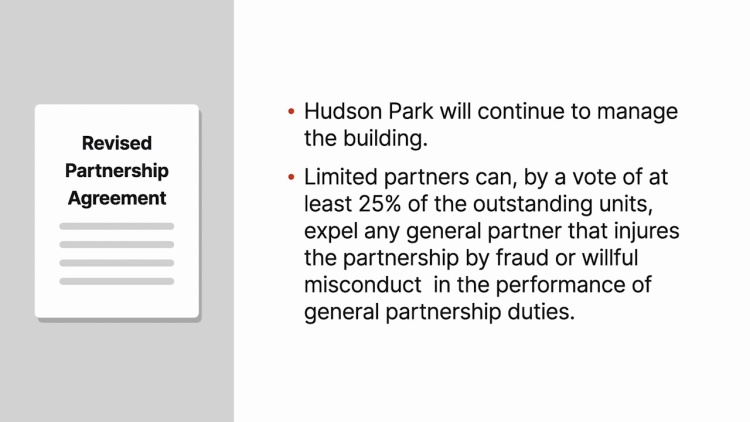KE Property Management Inc. v. 275 Madison Management Corp.
Delaware Court of Chancery
1993 WL 285900, No. 12683, 1993 Del. Ch. LEXIS 147 (1993)
- Written by Mary Pfotenhauer, JD
Facts
275 Madison Associates L.P. was a Delaware limited partnership. KE Property Management Inc. (KE) (plaintiff) was one of its general partners, and KJ Capital Management, Inc. (KJ), an affiliate of KE Property, was a limited partner. 275 Madison Management Corp. (275 Madison) (defendant) was the limited partnership’s managing general partner. Harry Skydell, 275 Madison’s president, misappropriated $2 million of the limited partnership’s funds. 275 Madison’s partnership agreement provided that the limited partners could expel any general partner that injured the partnership by fraud or willful misconduct, if at least 25 percent of the units outstanding were in favor. KJ, with 25 percent of the units outstanding in favor, sent a letter to 275 Madison removing it as managing general partner, claiming that Skydell’s misappropriation constituted fraud or willful misconduct on 275 Madison’s part. 275 Madison then filed a bankruptcy petition on behalf of the limited partnership. KE Property brought suit, seeking a declaratory judgment that the removal of 275 Madison was effective, and seeking to enjoin 275 Madison from purporting to act as the managing general partner. KE moved for summary judgment.
Rule of Law
Issue
Holding and Reasoning (Hartnett, V.C.)
What to do next…
Here's why 905,000 law students have relied on our case briefs:
- Written by law professors and practitioners, not other law students. 47,100 briefs, keyed to 995 casebooks. Top-notch customer support.
- The right amount of information, includes the facts, issues, rule of law, holding and reasoning, and any concurrences and dissents.
- Access in your classes, works on your mobile and tablet. Massive library of related video lessons and high quality multiple-choice questions.
- Easy to use, uniform format for every case brief. Written in plain English, not in legalese. Our briefs summarize and simplify; they don’t just repeat the court’s language.





